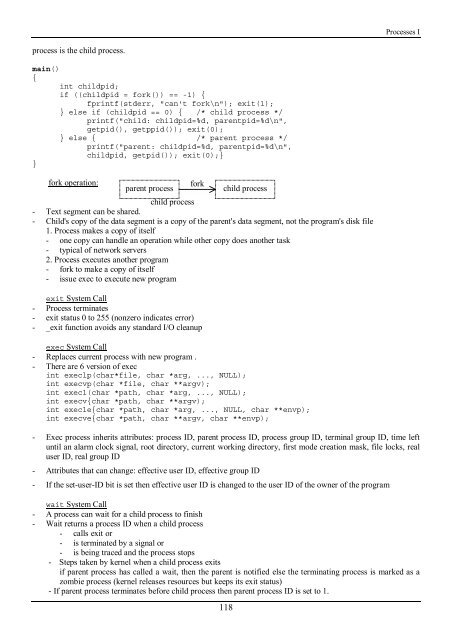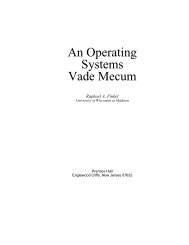Create successful ePaper yourself
Turn your PDF publications into a flip-book with our unique Google optimized e-Paper software.
Processes I<br />
process is <strong>the</strong> child process.<br />
main()<br />
{<br />
int childpid;<br />
if ((childpid = fork()) == -1) {<br />
fprintf(stderr, "can't fork\n"); exit(1);<br />
} else if (childpid == 0) { /* child process */<br />
printf("child: childpid=%d, parentpid=%d\n",<br />
getpid(), getppid()); exit(0);<br />
} else { /* parent process */<br />
printf("parent: childpid=%d, parentpid=%d\n",<br />
childpid, getpid()); exit(0);}<br />
}<br />
fork operation:<br />
parent process<br />
fork<br />
child process<br />
child process<br />
- Text segment can be shared.<br />
- Child's copy of <strong>the</strong> data segment is a copy of <strong>the</strong> parent's data segment, not <strong>the</strong> program's disk file<br />
1. Process makes a copy of itself<br />
- one copy can handle an operation while o<strong>the</strong>r copy does ano<strong>the</strong>r task<br />
- typical of network servers<br />
2. Process executes ano<strong>the</strong>r program<br />
- fork to make a copy of itself<br />
- issue exec to execute new program<br />
exit System Call<br />
- Process terminates<br />
- exit status 0 to 255 (nonzero indicates error)<br />
- _exit function avoids any standard I/O cleanup<br />
exec System Call<br />
- Replaces current process <strong>with</strong> new program .<br />
- There are 6 version of exec<br />
int execlp(char*file, char *arg, ..., NULL);<br />
int execvp(char *file, char **argv);<br />
int execl(char *path, char *arg, ..., NULL);<br />
int execv{char *path, char **argv);<br />
int execle{char *path, char *arg, ..., NULL, char **envp);<br />
int execve{char *path, char **argv, char **envp);<br />
- Exec process inherits attributes: process ID, parent process ID, process group ID, terminal group ID, time left<br />
until an alarm clock signal, root directory, current working directory, first mode creation mask, file locks, real<br />
user ID, real group ID<br />
- Attributes that can change: effective user ID, effective group ID<br />
- If <strong>the</strong> set-user-ID bit is set <strong>the</strong>n effective user ID is changed to <strong>the</strong> user ID of <strong>the</strong> owner of <strong>the</strong> program<br />
wait System Call<br />
- A process can wait for a child process to finish<br />
- Wait returns a process ID when a child process<br />
- calls exit or<br />
- is terminated by a signal or<br />
- is being traced and <strong>the</strong> process stops<br />
- Steps taken by kernel when a child process exits<br />
if parent process has called a wait, <strong>the</strong>n <strong>the</strong> parent is notified else <strong>the</strong> terminating process is marked as a<br />
zombie process (kernel releases resources but keeps its exit status)<br />
- If parent process terminates before child process <strong>the</strong>n parent process ID is set to 1.<br />
118
















